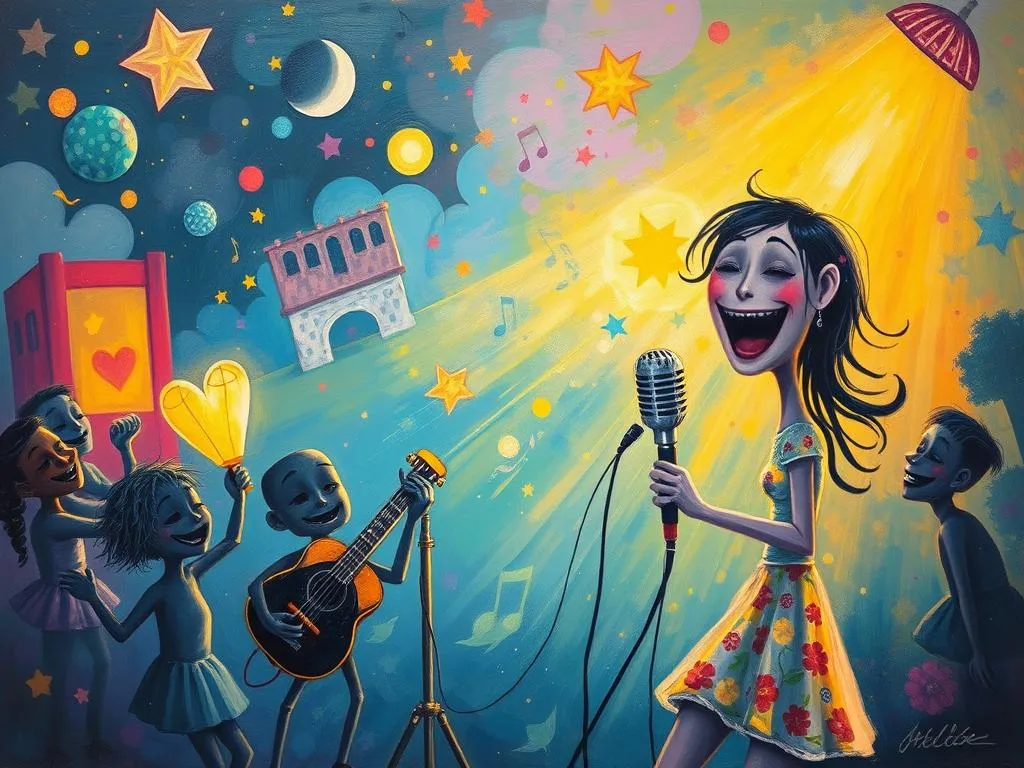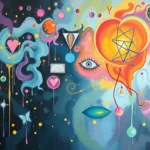
Dreams have always held a certain allure for humanity, serving as a mirror to our innermost thoughts, fears, and desires. Among the myriad of dream scenarios that individuals experience, karaoke dreams stand out for their vibrant imagery and emotional resonance. These dreams can evoke feelings of joy, anxiety, or even vulnerability, making them particularly intriguing. As we delve into the symbolism and meaning behind karaoke dreams, we will explore how they connect to our waking lives and what insights they may offer for personal reflection.
Symbolism and Meaning
At their core, karaoke dreams often symbolize expression and the desire for recognition. The act of singing in front of an audience—whether it be friends, family, or strangers—can reflect our yearning to showcase our talents, emotions, or even our true selves. When interpreting these dreams, it’s essential to consider the context and emotions surrounding the performance.
One prominent symbol in karaoke dreams is the microphone. It represents communication and the need to be heard. If you find yourself confidently holding the microphone, it may indicate a strong desire for self-expression in your waking life. Conversely, if you struggle to speak or hold the mic, it could signify feelings of inadequacy or fear of judgment. This duality highlights the complex nature of self-presentation—while we may crave acknowledgment, we also fear the scrutiny that comes with it.
Another critical element is the audience. The people watching you can carry significant meaning. A supportive audience may symbolize acceptance and encouragement, suggesting that you feel safe sharing your vulnerabilities. In contrast, an indifferent or critical audience might reflect your anxieties about how others perceive you. This fear of judgment can stem from various sources, including personal relationships, work environments, or social circles.
Additionally, the song selection in karaoke dreams can provide insight into your emotional state. Singing a happy, upbeat song may indicate a sense of joy or satisfaction with your life. On the other hand, belting out a melancholic ballad could reveal feelings of sadness, longing, or unresolved issues. The lyrics themselves may also hold symbolic significance, offering clues to your subconscious thoughts and emotions.
The setting of the karaoke event can further influence the dream’s meaning. For instance, a lively bar filled with friends indicates a desire for social connection, while a deserted venue may suggest feelings of isolation or loneliness. The atmosphere can dramatically shift the interpretation of the dream and reveal deeper layers of your emotional landscape.
Key Scenarios and Variations
Karaoke dreams can manifest in various scenarios, each carrying its unique implications. Let’s explore some common variations and how they might alter the dream’s interpretation.
One typical scenario involves forgetting the lyrics. This experience can evoke feelings of panic or embarrassment in the dreamer. Forgetting the words may symbolize a fear of losing your voice or not being able to express yourself effectively in waking life. It might indicate a situation where you feel unprepared or unable to articulate your thoughts or emotions. Reflecting on areas in your life where you feel voiceless or unheard can help you understand the underlying causes of this dream.
Another common variation is performing solo versus singing with others. A solo performance can signify a journey of self-discovery and empowerment, highlighting your desire to assert your individuality. It may represent a moment of personal triumph or a challenge you are facing on your own. In contrast, singing with a group can symbolize collaboration and the importance of community. This scenario might suggest that you value teamwork and support, or it may reveal your need to connect with others on a deeper level.
Dreams of winning a karaoke competition can also be significant. Such dreams often reflect feelings of achievement and validation. They may symbolize your desire for recognition in your waking life, whether in your career, personal relationships, or creative endeavors. This scenario can encourage you to pursue your passions and strive for success, reminding you that your efforts deserve acknowledgment.
Conversely, dreaming of bombing a performance—failing to impress the audience or being met with silence—can be particularly distressing. This scenario often reflects deep-seated insecurities and fears of inadequacy. It may point to feelings of self-doubt or concerns about your abilities and how you are perceived by others. Acknowledging these emotions can be the first step in addressing any underlying issues and finding ways to build your self-confidence.
Lastly, consider the time of day and environment in your dream. A bright, lively setting may evoke feelings of joy and excitement, while a dark, eerie atmosphere could symbolize fear or anxiety. The specific details of the venue can provide context that shapes your overall interpretation. Reflecting on these elements can lead to deeper insights about your emotional state and the relationships in your life.
Real-Life Connections and Takeaways
Understanding karaoke dreams can provide valuable insights into our everyday lives. These dreams often act as conduits for self-reflection, encouraging us to examine our relationships with ourselves and others. By exploring the symbolism and scenarios discussed, you can begin to draw connections between your dreams and your waking experiences.
One practical takeaway is to consider your current emotional state. Are there areas in your life where you feel unrecognized or undervalued? Reflecting on your relationships, work environment, and personal projects can help you identify these feelings. If you find yourself longing for acknowledgment, it may be time to advocate for yourself more assertively. Engage in conversations with those around you and express your needs and desires clearly.
Additionally, consider your communication style. Karaoke dreams often highlight our need for expression, so take a moment to reflect on how effectively you communicate in your waking life. Are there feelings you’ve been holding back? Are you afraid to voice your opinions? Engaging in open dialogues with friends, family, or coworkers can foster deeper connections and enhance your sense of belonging.
Another important aspect to consider is the support system you have in place. The audience in your karaoke dreams can symbolize the people in your life who either uplift or hinder you. Assess whether your relationships are nurturing or draining. Surrounding yourself with individuals who encourage and inspire you can significantly impact your self-esteem and overall satisfaction in life.
Moreover, use these dreams as a catalyst for creative expression. If you find joy in performing, explore artistic outlets that allow you to showcase your talents. Whether it’s singing, writing, or another form of creativity, engaging in these activities can help you process emotions and find fulfillment. Embrace opportunities to share your passions with others, as this can lead to increased confidence and a sense of community.
Finally, take time for self-reflection. Journaling about your karaoke dreams can be a powerful tool for understanding your emotions and thoughts. Write down the details of your dream, how it made you feel, and any connections you can draw to your waking life. This practice can deepen your self-awareness and provide clarity on the areas of your life that may require attention or change.
In conclusion, karaoke dreams offer a treasure trove of insights into our desires, fears, and emotional landscapes. By exploring the symbolism, scenarios, and real-life connections associated with these dreams, we can gain a better understanding of ourselves and our relationships. Embrace the opportunity to reflect on your experiences, and let these dreams guide you toward a more expressive and fulfilling life. Whether you find yourself belting out a power ballad or nervously fumbling with the microphone, remember that your dreams are a powerful tool for self-discovery and growth.







